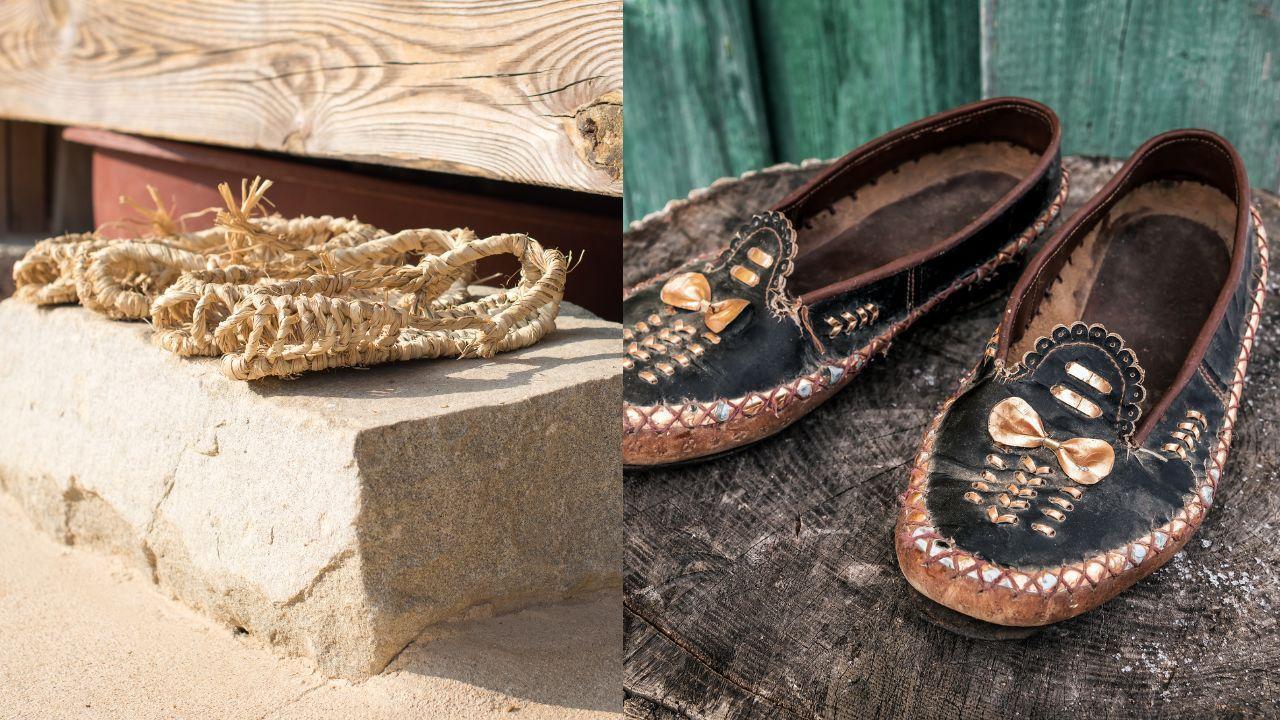
Post by: Raman Preet
Shoes are such a natural part of our daily lives that it's easy to forget they have a fascinating history stretching back thousands of years. From humble beginnings to the stylish footwear we see today, shoes have always served as more than just protection for our feet. This article takes you on a journey through the beginning of shoes, exploring when and why humans first started wearing them and how they’ve evolved.
Humans have been walking on Earth for millions of years, but early humans didn’t always wear shoes. Archaeological evidence suggests that the beginning of shoes occurred out of necessity. Early humans faced harsh terrains, scorching sand, sharp rocks, and cold climates. To survive, they needed something to protect their feet.
Before shoes, early humans likely wrapped their feet in leaves, animal hides, or grasses to shield them from the elements. These primitive "foot coverings" were the first step toward what would eventually become shoes.
Researchers debate the exact timeline of shoes' beginnings, but the earliest confirmed evidence dates back around 10,000 years. Some studies even suggest that humans may have started wearing shoes as far back as 40,000 years ago during the Ice Age. These early shoes were likely simple and functional, made from readily available materials like leather and fibres.

One of the oldest known examples of shoes is the "Ötzi Shoe," found on the body of a man preserved in ice in the Alps. Ötzi lived around 3,300 BCE, and his shoes were made from animal hide, with a layer of hay inside for warmth and comfort. This discovery highlights how a need for protection and adaptation to challenging environments drove the beginning of shoes.
As human civilisations developed, so did shoe design. Early footwear varied depending on the climate, culture, and available materials. For example, ancient Egyptians wore sandals made of palm leaves or papyrus, while people in colder regions, like the Inuit, crafted boots from animal skins to keep their feet warm.
By the time of the ancient Greeks and Romans, shoes had become more sophisticated. Greek sandals, often made from leather, were designed for functionality and style. Romans took it further, creating boots and sandals with intricate designs that symbolized social status. This period marked a significant milestone in the beginning of shoes, as footwear began to reflect culture and identity, not just practicality.
During the Middle Ages, shoes took on new shapes and styles. Pointed toes became popular in Europe, and shoes were often made from leather or fabric. For the wealthy, shoes became a symbol of status, with elaborate designs and fine craftsmanship.
However, common people wore simple, sturdy shoes that could withstand hard labour. This era also saw the invention of patterns and wooden platforms that people wore over their shoes to protect them from mud and dirt on the streets. This innovation highlighted the growing importance of shoes in everyday life.
By the Renaissance, shoes were no longer just functional—they became works of art. Wealthy individuals wore shoes with extravagant designs, including embroidered patterns and jewels. Heels became fashionable, particularly for women, and were seen as a status symbol.
This period also marked the rise of cobblers and skilled artisans who specialized in making and repairing shoes. Cobblers played a significant role in shaping the beginning of shoes as an industry, laying the foundation for modern shoemaking.
The Industrial Revolution in the 18th and 19th centuries transformed the world of footwear. Before this time, shoes were handmade, making them expensive and time-consuming to produce. With the advent of machinery, shoes could be mass-produced, making them more affordable and accessible.
Rubber soles were introduced during this period, leading to the invention of sneakers in the late 19th century. This innovation marked a turning point in the beginning of shoes, as comfort and practicality became a focus alongside style.
In the 21st century, shoes have become a billion-dollar industry, combining fashion, technology, and performance. From high-tech running shoes to elegant heels, there’s a shoe for every occasion and purpose. Modern materials like synthetic fabrics and memory foam have made shoes more comfortable and durable than ever.
Brands and designers have also embraced sustainability, creating shoes from recycled materials and promoting ethical manufacturing practices. This shift reflects how far we’ve come since the beginning of shoes, as humanity continues to innovate while honouring the past.
Understanding the beginning of shoes is not just about looking at the past; it’s about appreciating how something as simple as footwear has shaped human history. Shoes have protected us, allowed us to explore new terrains, and even helped define cultural identities. They are a testament to human ingenuity and the desire to improve life, step by step.
The Beginning of Shoes is a fascinating journey through the history of footwear, tracing its origins from necessity to the stylish and functional designs we see today. Early humans started wearing shoes to protect their feet from harsh terrains and climates, using natural materials like animal hides and leaves. Over time, shoes evolved to reflect cultural identity, with ancient Greeks and Romans crafting intricate designs and the Renaissance showcasing footwear as a fashion statement. The Industrial Revolution transformed shoemaking, leading to mass production and modern innovations like sneakers. Today, shoes blend technology, style, and sustainability, showcasing human ingenuity every step of the way.
This article was created for informational purposes by 'dxb news network.' The content is intended to provide general insights into the history and evolution of shoes. For detailed research or specific historical facts, please consult academic sources or experts in the field.
#trending #latest #ShoeHeritage #FootwearHistory #TimelessShoes #ShoeChronicles #HistoricFootwear #ShoeCraft #FootwearJourney #ShoeTraditions #ShoeDesignEvolution #ShoeInnovationJourney #ShoesThroughHistory #AncientShoes #FootwearCulture #ShoesTimeline #headlines #topstories #globalUpdate #dxbnewsnetwork #dxbnews #dxbdnn #dxbnewsnetworkdnn #bestnewschanneldubai #bestnewschannelUAE #bestnewschannelabudhabi #bestnewschannelajman #bestnewschannelofdubai #popularnewschanneldubai

HE Saeed Al Tayer reviews Al Shera’a, DEWA’s smart HQ—world’s tallest green building. Completion set for 2025...Read More.

Rory McIlroy wins the Masters in dramatic style, beating Justin Rose in a playoff and becoming the first European to complete the career Grand Slam....Read More.














Rory McIlroy wins Masters, completes career Grand Slam
Rory McIlroy wins the Masters in dramatic style, beating Justin Rose in a playoff and becoming the f

Rizwan Says English Isn’t a Must, Only Cricket Matters
Mohammad Rizwan proudly says he’s not ashamed of poor English. For him, playing cricket for Pakistan

Nightclub Roof Collapse in DR: Death Toll Hits 226
226 dead in Dominican nightclub collapse; nation mourns as families seek answers

Middle East’s Growing Influence in Formula 1 Recognized by FIA President Mohammed Ben Sulayem
Middle East’s Growing Influence in Formula 1 Recognized by FIA President Mohammed Ben Sulayem

'The Herds' starts journey from Africa to the Arctic Circle
‘The Herds,’ a cardboard animal show, starts in Congo to show how climate change pushes nature away.